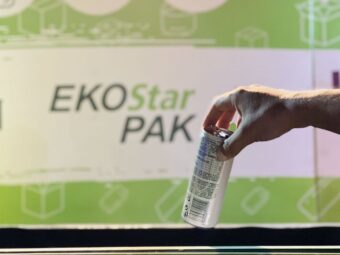
Ekostar Pak is one of the leading packaging waste management systems operators in the Republic of Serbia. Since its foundation in 2010, this company has recycled around 640,000 tons of packaging waste. During the past year alone, it sent almost 80,000 tons of packaging for recycling.
Through cooperation with more than 800 clients throughout Serbia, Ekostar Pak strives to be a reliable partner to the economy and fulfill its extended responsibility in recycling of packaging waste such as paper, plastic, glass, metal, and wood. These activities make it possible to reduce the amount of waste packaging that ends up in landfills since waste, with the adequate collection, becomes a resource for making a new product.
The director of Ekostar Pak, Bojana Perić, points out that the activities of the national operator imply that financial resources collected from the economy are invested in the collection and recycling of packaging waste to fulfill the prescribed obligations and achieve the set goals regarding the reuse and recycling of packaging placed on the market for a given year. Based on the latest report, more than 62 per cent of packaging was recycled in Serbia. More precisely 226,000 tons of packaging waste was used as a resource.
IN FOCUS:
Bojana says that her company advocates for the consistent implementation of primary selection, that is, the separation of waste at its place of origin, which is the first necessary step if we are talking about recycling.

“Only by properly separating the waste into certain fractions according to the future treatment can we get a raw material that can be used again. It is a misconception that everything recyclable can go in the same bin and that we will get a resource that we can use to make a future product. We should first separate the waste into containers such as buckets, containers, and bags, and then transport them separately to the line for secondary separation and preparation for future treatment,” emphasizes Bojana.
One of the key roles in the establishment and functioning of primary selection belongs to local self-governments. That is why Ekostar Pak launched the ECOpractice campaign, through which it will present the results of a joint cooperation to all existing partners from public utility companies and invite other local governments to join the partnership. A few months ago, a NALED study was published on the improvement of the current primary selection system, where it was recommended that the recycling system should be available to all households, as well as that recyclable waste should be collected in two separate streams. This would imply a separate separation of paper and cardboard from other recyclable waste (plastic, metal, tetra pack and glass).
A separate collection of wastepaper is particularly important because this raw material must not contain impurities or moisture. If the paper is damp or wet, the process of decomposition, rotting and swelling begin even during storage, making its further use impossible. Such paper can only be burned or taken to a landfill. Today, the public can often hear different opinions on whether it is more important to introduce a primary selection or a deposit system (that is, the introduction of a deposit that is paid when purchasing beverages and which is returned if the packaging is returned).
Prepared by: Milica Marković
Read the story in the new issue of the Energy portal Magazine Waste Management.



